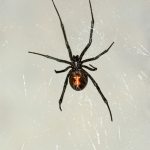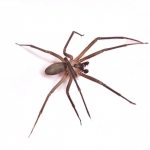There are, literally, thousands of spider species in the United States. However, only three of these species are poisonous to humans, and only 2 of them are located in the St Charles MO area. Other kinds of spiders may bite humans and pets, and cause swelling and itching, but unless the victim is allergic, there is no lasting damage. However, the three most poisonous ones are common, and found all across the country.
Black Widow Spiders
 The black widow spider is about 3/8 of an inch long. This spider has the classic Halloween spider shape, with a large, round abdomen. It is shiny black, and has a red hourglass on the stomach side of the abdomen. Look-alike spiders have a white dot on the back, but are not as dangerous.
The black widow spider is about 3/8 of an inch long. This spider has the classic Halloween spider shape, with a large, round abdomen. It is shiny black, and has a red hourglass on the stomach side of the abdomen. Look-alike spiders have a white dot on the back, but are not as dangerous.
Black widows usually like to live outdoors in ground-level detritus. Woodpiles, trash, shrubbery, and foundations offer the protection that these spiders love. They spin messy, sticky webs, preferring areas that do not have much foot traffic.
A bite from a black widow spider is not necessarily deadly, but it can be extremely painful. The venom is very toxic, but there is such a small amount of it that it does not kill people very often. The most vulnerable are children and people with chronic diseases. However, the victim may experience a rash, elevated blood pressure, and abdominal pain. The bite site should be washed with soap and water and antiseptic put on the spot. Then the victim should go to the doctor.
If you think your St. Charles home has black widow spiders, call All Solution Pest Control today.
Brown Recluse Spiders
 The brown recluse spider is often called the “violin spider” or “fiddle-back” because of the violin shape located behind its head. This spider is between ¼ and ½ inch long, with long legs on the front. In keeping with its name, this reclusive species prefers the dark areas in sheds, closets, and garages for its breeding grounds. They will also crawl into garment bags or shoe boxes.
The brown recluse spider is often called the “violin spider” or “fiddle-back” because of the violin shape located behind its head. This spider is between ¼ and ½ inch long, with long legs on the front. In keeping with its name, this reclusive species prefers the dark areas in sheds, closets, and garages for its breeding grounds. They will also crawl into garment bags or shoe boxes.
The bite of the brown recluse is extremely toxic, and is in the same family of poisons as snake venom. Victims bitten by a brown recluse may experience vomiting and fever. The bite area may become crusty and red, with a deep hole beneath the scab. This hole can take months to heal, and may become infected and experience tissue death. If you or a pet have been bitten by a brown recluse, you should immediately get medical treatment.